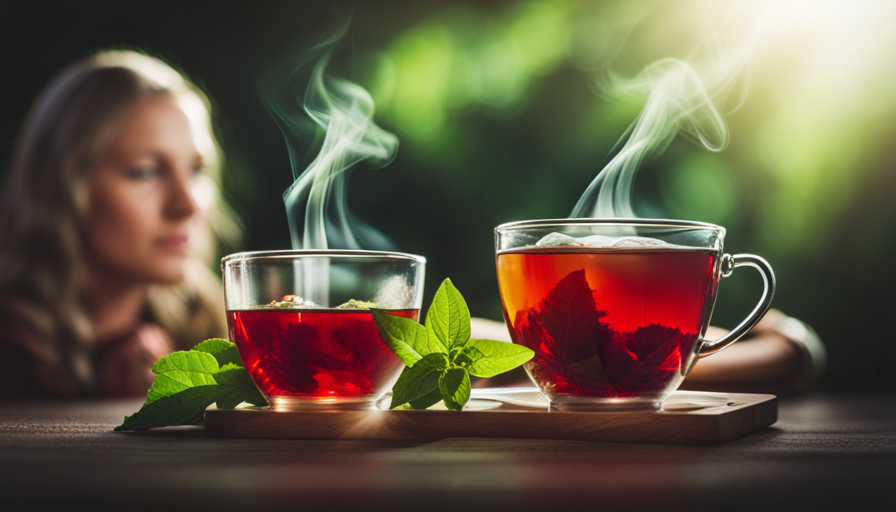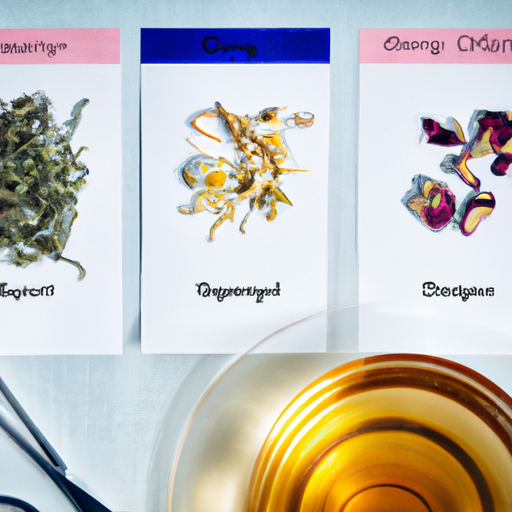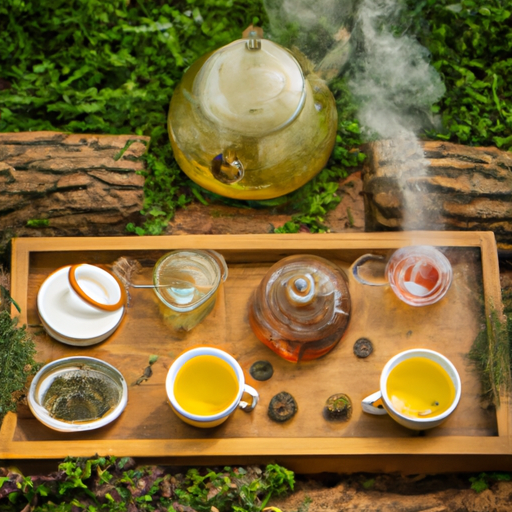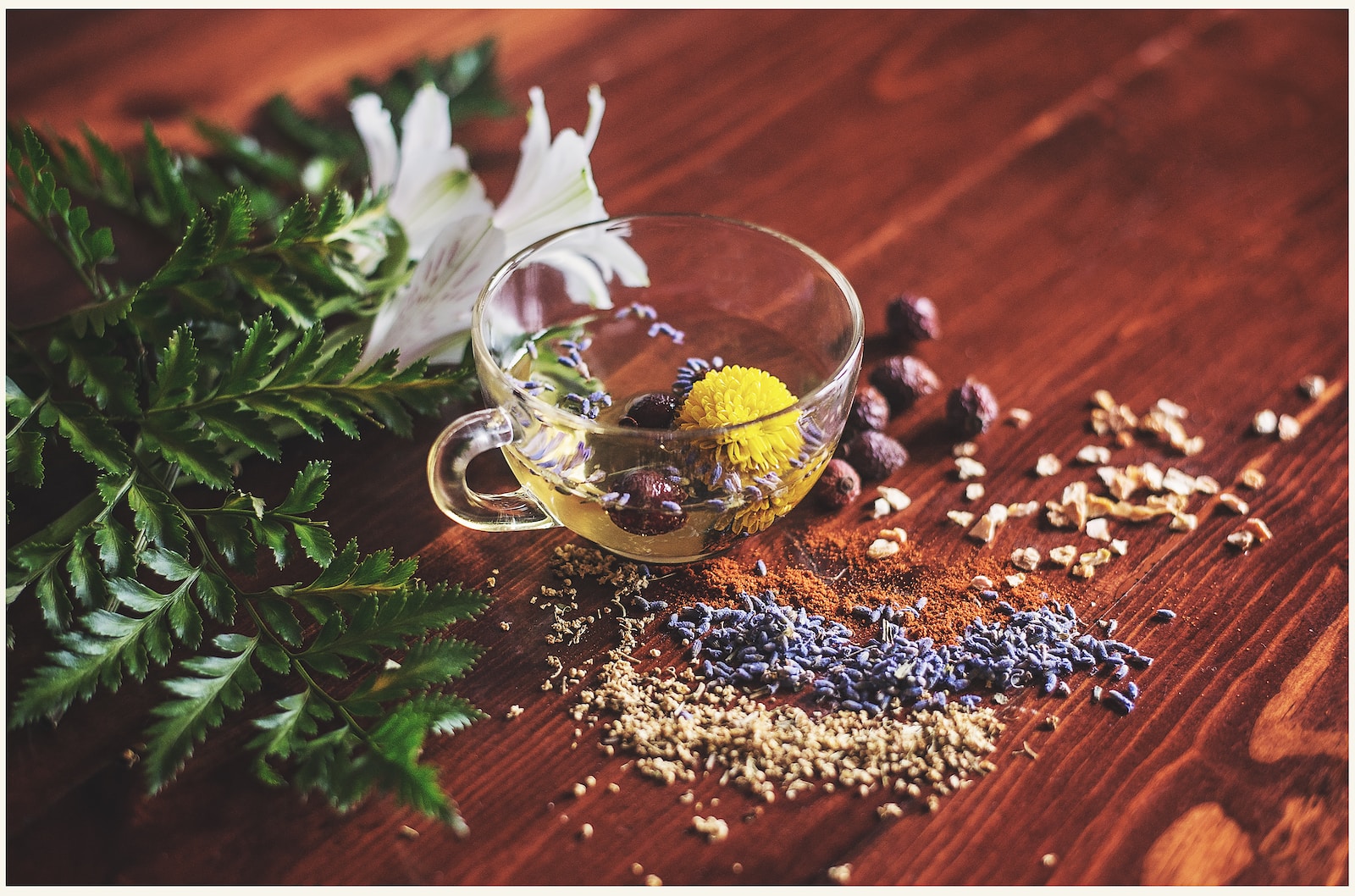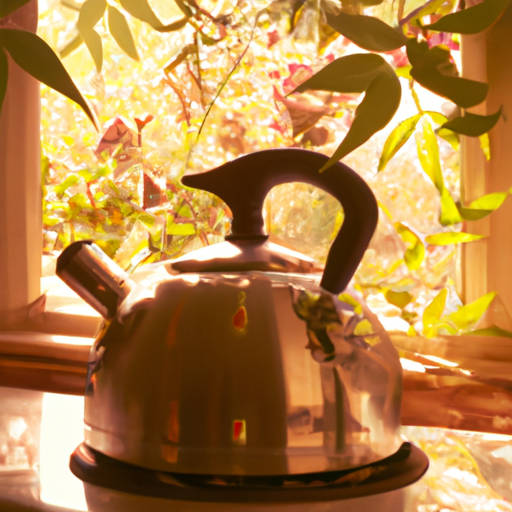This popular saying holds true when it comes to iron deficiency – ‘An ounce of prevention is worth a pound of cure.’ Iron deficiency is a prevalent issue caused by low iron levels in the body, resulting in symptoms such as fatigue, weakness, and trouble focusing.
While there are various ways to address this issue, one natural and effective approach is through herbal teas. Herbal teas not only offer a comforting and soothing experience, but they also provide essential nutrients that can help replenish iron levels.
In this article, I will explore the benefits of three herbal teas that are particularly beneficial for iron deficiency: nettle tea, dandelion root tea, and yellow dock tea. Additionally, I will share tips on how to incorporate these teas into your daily routine, as well as other natural remedies that can complement their effects.
Remember, it’s always important to consult with a healthcare professional before making any significant changes to your diet or treatment plan. So, let’s dive in and discover the power of herbal teas in combating iron deficiency.
Key Takeaways
- Nettle tea, dandelion root tea, and yellow dock tea are herbal teas that can be beneficial for addressing iron deficiency.
- Herbal teas should not replace conventional medical treatment but can be used as a complementary approach.
- Herbal teas should be consumed daily to potentially support iron levels.
- Pairing herbal teas with iron-rich foods and vitamin C can enhance iron absorption.
Understanding Iron Deficiency
Are you struggling with iron deficiency? Let’s dive into understanding this common condition and how it can be addressed.
Iron deficiency is a condition characterized by low levels of iron in the body. Common symptoms include fatigue, weakness, pale skin, and shortness of breath. It can be caused by various factors such as inadequate dietary intake of iron-rich foods, poor iron absorption, or excessive blood loss. If left untreated, iron deficiency can lead to anemia, a more severe condition that affects the production of red blood cells.
There are several treatment options available for iron deficiency. The most common approach is through iron supplementation, either in the form of oral iron tablets or intravenous iron injections. However, some individuals may prefer alternative treatment options, such as herbal teas. While herbal teas are not a primary treatment for iron deficiency, certain teas like nettle tea, dandelion tea, and yellow dock tea are believed to have iron-boosting properties. These teas may help improve iron absorption or provide small amounts of iron.
It’s important to note that herbal teas should not replace conventional medical treatment but can be used as a complementary approach.
In the next section, we will explore the potential benefits of herbal teas for iron deficiency.
Herbal Teas for Iron Deficiency
Discover the amazing power of nature’s remedies to replenish and revitalize your blood, leaving you feeling stronger and more vibrant than ever before. When it comes to iron deficiency, herbal teas can be a great alternative to iron supplements. Not only do they provide a natural source of iron, but they also offer a range of other health benefits.
Here are two herbal tea recipes that can help address iron deficiency:
-
Nettle Tea:
- Nettle tea is rich in iron and can help boost your iron levels naturally.
- It also contains vitamin C, which aids in iron absorption.
- To make nettle tea, simply steep dried nettle leaves in hot water for 5-10 minutes, strain, and enjoy.
-
Dandelion Root Tea:
- Dandelion root tea is another excellent option for increasing iron intake.
- It’s packed with iron, vitamins, and minerals that support healthy blood production.
- To make dandelion root tea, boil chopped dandelion roots in water for 10-15 minutes, strain, and drink.
These herbal teas not only provide a natural source of iron but also offer additional health benefits.
Now, let’s delve into the benefits of nettle tea in the next section.
Benefits of Nettle Tea
Boost your energy and invigorate your body with the refreshing and revitalizing benefits of indulging in a cup of nourishing nettle tea. Nettle tea, derived from the leaves of the stinging nettle plant, has been used for centuries to promote wellness and treat various ailments.
Packed with vitamins, minerals, and antioxidants, nettle tea offers a host of benefits for those suffering from iron deficiency. Nettle tea is a fantastic source of iron, making it an ideal choice for individuals with low iron levels. Iron is essential for the production of red blood cells and the transportation of oxygen throughout the body. By regularly consuming nettle tea, you can help replenish your iron stores and combat the symptoms of iron deficiency, such as fatigue and weakness.
In addition to its iron content, nettle tea is also rich in other nutrients, including vitamin C, which aids in iron absorption. This synergy between iron and vitamin C further enhances the effectiveness of nettle tea in addressing iron deficiency.
To enjoy the benefits of nettle tea, you can easily incorporate it into your daily routine. Simply steep a nettle tea bag or a tablespoon of dried nettle leaves in hot water for 5-10 minutes. You can also experiment with nettle tea recipes, such as adding lemon or honey for added flavor.
Transitioning into the subsequent section about the benefits of dandelion root tea, it’s important to explore other herbal teas that can support your journey towards optimal health.
Benefits of Dandelion Root Tea
Dandelion root tea has numerous benefits for our health. Firstly, it supports liver function by stimulating the production of bile, which helps in the digestion and elimination of toxins.
Secondly, this herbal tea is high in iron and vitamin C, which are essential nutrients for our body.
Lastly, dandelion root tea has detoxifying properties that can help cleanse our system and improve overall well-being.
Supports Liver Function
Drinking herbal tea can be a beneficial way to support liver function and improve iron deficiency. Dandelion root tea, in particular, has been shown to have detoxification benefits and promote liver health. The liver plays a crucial role in detoxifying our body by filtering out toxins and waste products. Research suggests that dandelion root tea may help enhance the liver’s ability to eliminate harmful substances from the body, thus supporting overall liver function.
By improving liver health, dandelion root tea indirectly aids in addressing iron deficiency. Now, let’s move on to the next section, where we’ll explore how dandelion root tea is high in iron and vitamin C, two essential nutrients for combating iron deficiency.
High in Iron and Vitamin C
Not only is dandelion root tea a delicious and refreshing beverage, but it also provides a natural source of iron and vitamin C, two crucial nutrients for maintaining a healthy body. Incorporating herbal teas like dandelion root tea into your diet can help address iron deficiency, especially when combined with iron-rich foods.
The iron content in dandelion root tea can contribute to increasing your iron intake, which is vital for the production of red blood cells and preventing anemia. Additionally, the vitamin C in dandelion root tea enhances iron absorption, maximizing its benefits. To further enhance iron absorption, consider pairing dandelion root tea with foods high in iron, such as spinach, lentils, and quinoa. These synergistic combinations can optimize your body’s iron levels and support overall health.
Transitioning into the next section, dandelion root tea also offers detoxifying properties that promote liver health.
Detoxifying Properties
Enhance your body’s natural detoxification process by incorporating dandelion root tea into your daily routine, allowing your liver to cleanse and rejuvenate. Dandelion root tea has long been known for its detoxification benefits. This herbal tea recipe is rich in antioxidants and helps to flush out toxins from your body. It stimulates bile production, aiding in the digestion and absorption of nutrients, including iron.
Additionally, dandelion root tea is a diuretic, which promotes the elimination of waste and excess fluid from the body. Its detoxifying properties can also improve skin health and support overall well-being. Incorporating dandelion root tea into your diet can be a simple and effective way to support your body’s natural detoxification process.
Now, let’s explore the benefits of yellow dock tea, another herbal tea that can help with iron deficiency.
Benefits of Yellow Dock Tea
One great benefit of Yellow Dock Tea is that it can help boost iron levels in the body. This herbal tea is known for its high iron content, making it an excellent choice for individuals with iron deficiency.
Yellow Dock Tea offers several benefits that can contribute to increasing iron levels:
-
Digestive Support: Yellow dock contains anthraquinones, which’ve been shown to stimulate the production of digestive enzymes. This can improve nutrient absorption and aid in the digestion of iron-rich foods.
-
Blood Cleansing: The detoxifying properties of Yellow Dock Tea help to cleanse the blood, removing toxins and promoting optimal functioning of the circulatory system. This can enhance the transport of iron to the cells and tissues that need it.
-
Anti-Inflammatory Effects: Yellow dock has anti-inflammatory properties that can help reduce inflammation in the body. Inflammation can interfere with iron absorption and utilization, so reducing inflammation can improve iron levels.
To enjoy these benefits, it’s important to use the proper dosage of Yellow Dock Tea. It’s recommended to consume 1 to 2 cups of Yellow Dock Tea per day. However, it’s always advisable to consult with a healthcare professional before starting any herbal tea regimen.
Now, let’s explore how to prepare and enjoy other herbal teas that offer various health benefits.
How to Prepare and Enjoy Herbal Teas
To fully enjoy the health benefits of herbal teas, start by following these simple steps to prepare and savor them.
First, choose high-quality loose herbal tea leaves or tea bags. Look for teas that are specifically formulated to address iron deficiency, such as nettle tea or dandelion tea, as they can provide the necessary nutrients to support iron levels in the body.
Next, boil fresh, filtered water and pour it over the tea leaves or tea bag in a cup or teapot. Allow the tea to steep for the recommended amount of time, usually around 5-10 minutes, to extract the beneficial compounds.
Once the tea has steeped, remove the leaves or tea bag and add any desired sweeteners or flavorings, such as honey or lemon.
Finally, sit back, relax, and savor the warm, soothing taste of your herbal tea. Incorporating herbal teas into your diet can be a simple and enjoyable way to support your overall health and well-being.
Incorporating Herbal Teas into Your Diet
When it comes to incorporating herbal teas into your daily routine, there are a few key points to keep in mind. First, it’s recommended to consume herbal teas on a daily basis to reap their potential health benefits.
Secondly, combining herbal teas with iron-rich foods can enhance the absorption of iron in the body, making it an excellent choice for individuals with iron deficiency.
Lastly, incorporating herbal teas into your diet in the long-term can provide various health benefits, such as improved digestion, increased hydration, and a boost to the immune system.
Daily Consumption Recommendations
For those looking to increase their iron levels naturally, it’s important to know the daily consumption recommendations for herbal teas. Incorporating herbal teas into your daily routine can be a great way to support your iron intake, but it’s important to consume them in moderation. Here are some daily consumption guidelines to keep in mind:
-
Start with one cup of herbal tea per day and gradually increase if needed.
-
Pay attention to the ingredients and choose herbal teas that’re known to be rich in iron.
-
Be mindful of potential side effects such as digestive issues or allergic reactions.
-
Consult with a healthcare professional if you’ve any pre-existing conditions or concerns.
-
Remember to balance your herbal tea consumption with a varied and balanced diet.
By following these recommendations, you can safely incorporate herbal teas into your daily routine to support your iron levels.
In the next section, we’ll discuss how to combine herbal teas with iron-rich foods for maximum benefits.
Combining with Iron-Rich Foods
By incorporating iron-rich foods into my diet alongside these flavorful herbal infusions, I’ll be amazed at the incredible taste and the boost of energy they provide. Iron-rich foods play a crucial role in combating iron deficiency. They provide the necessary nutrients for the body to produce red blood cells and prevent anemia. Additionally, the absorption of iron in the body is enhanced by the presence of vitamin C. Including foods like spinach, lentils, and lean meats, which are high in iron, along with herbal teas, can ensure a sufficient intake of this essential mineral. To better understand the importance of iron-rich foods and their absorption in the body, consider the following table:
| Iron-Rich Foods | Iron Content (mg) | Vitamin C Content (mg) |
|---|---|---|
| Spinach | 2.7 | 8.4 |
| Lentils | 3.3 | 1.5 |
| Lean Meats | 2.6 | 0 |
| Citrus Fruits (e.g., oranges) | 0 | 53.2 |
By consuming these foods alongside herbal teas, you can maximize iron absorption and improve your overall health. Moving forward, let’s explore the long-term benefits of incorporating these practices into your daily routine.
Long-Term Benefits
Incorporating iron-rich foods into your diet and pairing them with other nourishing habits can have significant long-term benefits for your overall health.
For example, imagine a busy working mom who struggled with low energy levels and frequent fatigue. After incorporating iron-rich foods like spinach and lentils into her meals alongside regular exercise, she noticed a significant increase in her energy levels and was able to keep up with her demanding schedule more easily. This is because iron plays a crucial role in the production of hemoglobin, which carries oxygen to all parts of the body.
By consistently consuming iron-rich foods, the body can maintain healthy levels of hemoglobin, leading to improved energy levels and overall well-being. However, it’s important to note that incorporating iron-rich foods alone may not be sufficient for everyone with iron deficiency. Therefore, exploring other natural remedies for iron deficiency can provide further support in addressing this condition.
Other Natural Remedies for Iron Deficiency
Boost your intake of iron naturally by trying out these other natural remedies for iron deficiency. In addition to herbal teas, there are several other ways to increase your iron levels through natural supplements and dietary modifications. Here are five options to consider:
-
Vitamin C-rich foods: Consuming foods high in vitamin C, such as citrus fruits and leafy greens, can enhance iron absorption in the body. Pairing these foods with iron-rich sources can maximize the benefits.
-
Cooking in cast iron pots: Cooking acidic foods like tomatoes or beans in cast iron pots can increase iron content in your meals. This simple technique provides a natural way to boost your iron intake.
-
Blackstrap molasses: This thick, dark syrup is packed with iron and can be added to baked goods, smoothies, or used as a natural sweetener. It’s a delicious way to supplement your iron levels.
-
Increase legume intake: Legumes like lentils, chickpeas, and soybeans are excellent sources of iron. Adding more legumes to your diet can help increase your iron stores.
-
Limit tea and coffee consumption: These beverages contain compounds that can hinder iron absorption. Limiting their intake, especially during meals, can improve iron absorption.
Incorporating these natural remedies into your routine can be beneficial for iron deficiency. However, it’s always important to consult with a healthcare professional to ensure you’re taking the appropriate steps to address your iron deficiency effectively.
Consultation with a Healthcare Professional
When it comes to managing iron deficiency, it’s important to seek medical advice from a healthcare professional. They can help monitor iron levels and create an individualized treatment plan based on your specific needs.
By consulting with a healthcare professional, you can ensure that you’re receiving the most effective and appropriate treatment for your iron deficiency.
Seeking Medical Advice
Consulting a doctor can provide crucial clues about which herbal tea to try for tackling iron deficiency. When seeking alternative remedies, it’s important to consider the potential side effects of herbal teas.
A healthcare professional can assess your individual situation, taking into account any existing medical conditions or medications that may interact with certain herbs. They can also recommend specific herbal teas that have been studied for their iron-boosting properties, such as nettle tea or dandelion root tea.
Additionally, a doctor can help you understand how herbal teas fit into your overall treatment plan for iron deficiency and how they can complement other interventions, such as dietary changes or iron supplements. Monitoring iron levels regularly is essential to evaluate the effectiveness of the chosen herbal tea and make any necessary adjustments.
Monitoring Iron Levels
Regularly checking your iron levels is crucial to track the progress of your treatment plan and ensure you’re on the right path towards optimal health. Monitoring iron levels allows you to gauge the effectiveness of incorporating herbal teas into your routine.
While herbal teas can provide some level of iron, it’s important to note that they may not be as potent as other sources such as iron-rich foods or supplements. Therefore, monitoring your iron levels is essential to determine if the herbal teas are meeting your body’s requirements.
Regular blood tests, conducted by your healthcare provider, will provide accurate measurements of your iron levels and help guide your treatment plan. These tests will help determine if adjustments need to be made to your herbal tea regimen or if additional interventions are necessary.
As we move into discussing individualized treatment plans, it’s important to consider the information gathered from monitoring iron levels.
Individualized Treatment Plans
To create an individualized treatment plan, you can work with your healthcare provider to determine the best course of action based on your unique needs and circumstances, such as your age, gender, and overall health.
Did you know that studies have shown that personalized treatment plans can lead to a 50% greater improvement in iron levels compared to generic treatment approaches? This is because individualized care takes into account the specific factors that may be affecting your iron deficiency and tailors the treatment accordingly.
Your healthcare provider may recommend dietary changes, iron supplements, or herbal teas that are specifically beneficial for iron deficiency. By customizing the treatment plan to address your specific needs, you’re more likely to see positive results.
With this in mind, let’s now explore the conclusion and final thoughts on managing iron deficiency.
Conclusion and Final Thoughts
So, now that you’ve learned about the different herbal teas that can help with iron deficiency, you’re ready to start incorporating them into your daily routine! Herbal teas can be a great addition to your diet to help increase your iron levels.
Here are some key points to keep in mind when incorporating herbal teas for long term benefits:
-
Consistency: Consistently drinking herbal teas that are rich in iron can help maintain your iron levels over time. Make it a habit to have a cup of herbal tea every day.
-
Variety: Try different herbal teas to keep things interesting and to ensure you’re getting a variety of nutrients. Dandelion root tea, nettle tea, and yellow dock tea are all great options to consider.
-
Pairing with Vitamin C: Consuming herbal teas along with foods rich in vitamin C can enhance iron absorption. Consider having a glass of orange juice or a serving of strawberries alongside your herbal tea.
-
Patience: It’s important to remember that herbal teas may not provide immediate results. Consistency and patience are key when it comes to reaping the long term benefits.
-
Consultation: If you have a severe iron deficiency or are on medication, it’s always a good idea to consult with a healthcare professional before incorporating herbal teas into your treatment plan.
Incorporating herbal teas into your daily routine can be a simple and enjoyable way to support your iron levels. Remember to be consistent, try different teas, pair with vitamin C, be patient, and seek professional advice if needed. Cheers to a healthier you!
Frequently Asked Questions
Can herbal teas completely replace iron supplements for iron deficiency?
While herbal teas can provide some benefits for iron deficiency, they can’t completely replace iron supplements. Certain herbal teas like nettle, dandelion, and yellow dock contain trace amounts of iron, but they aren’t as easily absorbed by the body as iron supplements. Herbal teas can be a complementary addition to an iron-rich diet, but it’s important to consult a healthcare professional for proper treatment and guidance.
Are there any potential side effects or risks associated with consuming herbal teas for iron deficiency?
There are potential side effects and risks associated with consuming herbal teas for iron deficiency.
While herbal teas can be a natural source of iron, they may also contain compounds that can interfere with iron absorption or cause gastrointestinal discomfort.
Additionally, some herbal teas may interact with medications or have adverse effects on certain individuals.
It’s important to consult with a healthcare professional before incorporating herbal teas into your iron deficiency treatment plan to ensure safety and efficacy.
Can herbal teas be consumed by pregnant women or individuals with certain medical conditions?
Herbal teas can generally be consumed by pregnant women and individuals with certain medical conditions. However, it’s important to consult with a healthcare professional before incorporating herbal teas into your diet, especially during pregnancy or if you have specific medical conditions. Some herbal teas may interact with medications or have potential side effects. It’s always best to ensure the safety and appropriateness of consuming herbal teas based on individual circumstances.
How long does it take to see results in iron levels after regularly consuming herbal teas?
Regularly consuming herbal teas can show results in iron levels within a few weeks. Herbal teas can be effective in improving iron deficiency, but it’s important to note that the effectiveness may vary from person to person.
While herbal teas are a natural source of iron, they may not be as potent as iron supplements. If you have severe iron deficiency, it’s recommended to consult a healthcare professional who can advise on the most suitable treatment plan for you.
Are there any specific herbal tea blends that are more effective for iron deficiency than others?
When it comes to herbal tea blends for boosting iron levels, it’s important to consider their effectiveness for iron deficiency. Some blends may be more beneficial than others in addressing this issue.
By comparing the efficacy of different herbal teas, we can determine which ones are most suitable. Symbolically, finding the right blend is like discovering a key that unlocks improved iron levels.
Through knowledgeable research and evidence-based information, we can identify the most effective herbal teas for iron deficiency.
Conclusion
In conclusion, incorporating herbal teas into your diet can be a beneficial way to address iron deficiency. Nettle tea, with its rich iron content, can help boost your iron levels and improve overall health.
Dandelion root tea is another great option, as it supports liver function and aids in iron absorption.
Additionally, yellow dock tea can stimulate the production of red blood cells, further combating iron deficiency.
Just like a warm cup of herbal tea on a cold winter’s day, these natural remedies can provide comfort and nourishment to your body. So, sip away and enjoy the healing power of herbal teas!

